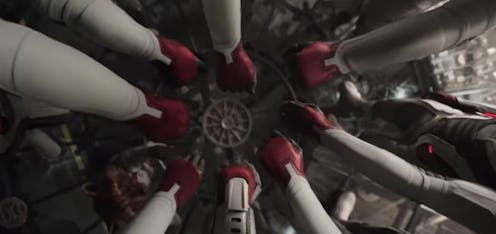Entertainment
The One ‘Endgame’ Scene Everyone’s Talking About Is Simultaneously Thrilling & Frustrating

Major spoilers ahead for Avengers: Endgame. There will no doubt be a good number of scenes in Endgame that will have audience members cheering, reeling, and crying. There are quiet scenes, like Captain America's post-snap support group, featuring some LGBTQ representation, albeit through a very minor character, and the 1970 heart-to-heart Tony Stark gets to have with his father, Howard. For others, it might be the more intense battle moments that stand out, like when Captain America finally takes hold of Thor's hammer, Mjolnir, or when Captain Marvel totally obliterates Thano's ship. As a female fan, the scene that stood out the most to me was an incredibly powerful moment for the women of the MCU, and one that acknowledged the franchise for 11 years of progress. As impactful as it is, however, that scene also points to a serious ongoing issue that needs to finally be addressed.
The moment comes during the climactic battle near the end of the film. The snap has been undone, so all of our beloved heroes have returned. The Thanos from Infinity War is killed early in Endgame by Thor, but a Thanos from 2014 has managed to travel to the future and is attacking Avengers headquarters with his entire fleet. The good guys are attempting to get their new Infinity Gauntlet, made by Stark tech and outfitted with Infinity Stones from the past, back to Ant-Man's van to get the stones back to their own times and out of Thano's 2.0's reach.
The battlefield is a mess of fire, rubble, and dust, and Spider-Man has possession of the Gauntlet. He passes it off to Captain Marvel and says, pointing towards the messy path of monsters and bad guys on the way to the van, "I don't know how you're gonna get through al of that." Suddenly, a powerful female voice says in the background, "Don't worry, she's got help." The camera pans to Okoye, ready with her staff to help clear Captain Marvel's path.
But she's not alone either. One by one, the women of the MCU come forward to have Captain Marvel's back. Out of the dust and smoke emerge Scarlet Witch, Shuri, Wasp, Gamora, Nebula, Mantis, Valkyrie riding a freaking Pegasus, and Pepper Potts sporting her own Iron Woman suit. It's an incredible moment of female solidarity that is actually quite shocking in its emotional heft.
In the lead up to Endgame's release, Washington Post writer Monica Hesse watched all 21 movies in the Marvel Cinematic Universe and noted that each subsequent movie makes a bigger and bigger step when it comes to female representation. She marvels at "the emotional experience of watching a decade fly by, commercial-free, via Netflix and Amazon, and seeing things progressively suck a little bit less. Of watching the conversations America was having — about representation, about women in the workforce or the military, about equality in romantic relationships — be interpreted onto the big screen."
Within the world of Endgame, these women characters are standing with Captain Marvel, but, if you think about it, they're also standing in support of Captain Marvel the movie — the first standalone film for a woman in the MCU. Because Captain Marvel isn't alone, and shouldn't be alone. As more and more women kept joining and joining and joining the fray, I couldn't help but think, damn, there are a lot of female superheroes in this movie, which makes me more excited for whatever future Marvel has in store for them, and who else could potentially join their ranks.
However, there is one glaring omission during the assemblage of powerhouse MCU women in that scene. Black Widow, the first and most prominent female member of the Avengers, is absent, having died earlier in the movie so that Hawkeye could obtain the Soul Stone on Vormir back in 2014. The two arrive on the planet only to be told by Red Skull the same thing he told Thanos in Infinity War, that in order to obtain the Soul Stone, one must lose something they love. Of course, Nat and Clint love each other, they are the closest of friends and Nat has basically joined his family. They fight it out for the right to sacrifice themselves, Black Widow wins, and hurls herself off the cliff, allowing for Hawkeye to take possession of the Soul Stone.
But Black Widow's death, shall we say, stinks. As I watched the male Avengers react to her death, their tears of grief turning into promises of revenge and newfound motivation to succeed, I couldn't help but think that Endgame just fridged Black Widow. The "fridging" trope is perpetuated when the death of a female character simply exists to advance the plot line of a man through emotional turmoil.
The scene on Vormir with Black Widow and Hawkeye arguing over who should sacrifice their life also brings up some icky issues surrounding Natasha's "worthiness" as a woman. We learned in a much debated storyline in Avengers: Age of Ultron that Nat had to undergo forced sterilization during her training. In Endgame, she pleads to Hawkeye that he should live because he has a family to get back to, and she doesn't. Once again, Natasha is reduced to her inability to bear children — this time, it's a death sentence.
Of course, it can be argued that Black Widow's death doesn't happen just to motivate her fellow Avengers. They'd be continuing their mission whether or not she had lived. It stings, though, that the aforementioned moment in Endgame is a callback to Black Widow's own feminist stand in Infinity War, and she doesn't get to be present for the next one.
So though it's certainly memorable and thrilling to see these brilliant, fearless women back each other up on the battlefield, that Endgame scene is also a stark reminder that the MCU never did solve its Black Widow problem.